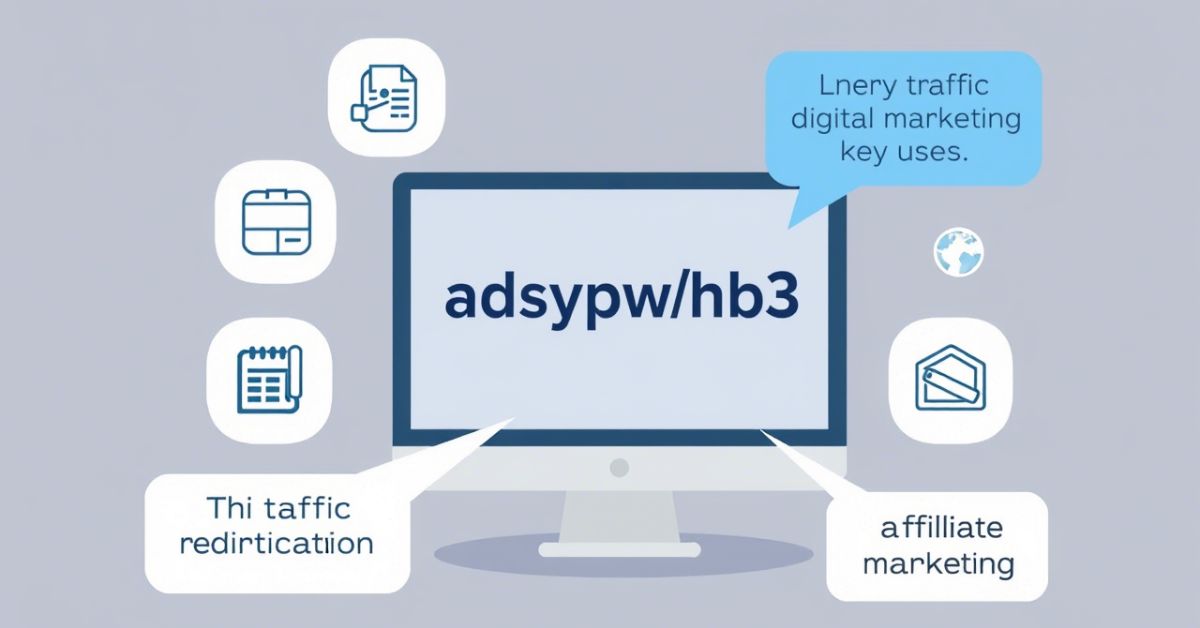Shortened URLs and What They Mean
In today’s fast-paced digital world, shortened URLs have become a common sight across the internet. Whether you’re browsing social media, checking your inbox, or scrolling through online forums, you may often come across links like “adsy.pw/hb3” or similar combinations of letters and numbers after a domain name. These are known as shortened URLs—compact versions of longer web addresses designed to make sharing easier and more efficient.
But what exactly do these short links mean? Where do they lead? And most importantly, are they safe? In this article, we’ll explore one specific example: adsy.pw/hb3 , breaking down its structure, purpose, and potential implications in detail.
What Is Adsy.pw?
Adsy.pw is a URL shortening service that allows users to convert long, complex web addresses into shorter, more manageable links. Like other services such as Bitly or TinyURL, Adsy.pw provides a way to share links without cluttering messages or posts with lengthy URLs. It’s commonly used by marketers, content creators, and even everyday users who want to simplify their shared links.
However, because shortened URLs obscure the original destination, they can sometimes be misused for malicious purposes. This makes it crucial to approach any unknown short link with caution.
Breaking Down the Structure: What Does “hb3” Mean?
The part of the URL after the slash — in this case, hb3 — is known as the path or endpoint. It acts as a unique identifier assigned by the URL shortener to direct users to the intended destination page. Each combination of characters corresponds to a different long URL.
So when you see adsy.pw/hb3 , it simply means that someone has created a shortened version of a longer web address using the Adsy.pw service, and the system has assigned the identifier “hb3” to that particular link.
It’s important to note that:
- The meaning of “hb3” is not standardized.
- It could represent anything from random characters to an encoded message or tracking ID.
- Without additional context, it’s impossible to know what the original URL was just by looking at the shortened version.
Why Are Shortened URLs Used?
There are several reasons why people use URL shorteners like Adsy.pw:
- Convenience : Long URLs can be difficult to read, type, or remember. Shortened links make sharing much easier.
- Social Media Optimization : Platforms like Twitter impose character limits, so shortening URLs helps save space.
- Analytics and Tracking : Many URL shortening services offer tracking features, allowing users to monitor how many times a link has been clicked, where traffic is coming from, and more.
- Branding : Some services allow custom domains (e.g., brand.co instead of bit.ly), which enhances brand recognition.
- Marketing Campaigns : Marketers often use short links in email campaigns, QR codes, or offline materials like flyers and billboards.
Despite these benefits, there are also risks involved, especially when dealing with unfamiliar short links.
Common Use Cases for Links Like adsy.pw/hb3
Shortened URLs are versatile and can appear in various contexts. Here are some typical scenarios where you might encounter a link like adsy.pw/hb3 :
| Scenario | Description |
|---|---|
| Social Media Posts | Influencers or brands share links to blog posts, products, or landing pages. |
| Email Newsletters | Companies send out promotional offers or updates with short links for easy access. |
| Online Ads | Paid advertisements on platforms like Facebook or Google may include shortened URLs. |
| Forums and Chat Groups | Users share links to videos, articles, or resources without overwhelming the conversation. |
| QR Codes | Businesses generate QR codes that point to shortened URLs for better scanning performance. |
Each of these cases shows how useful short links can be — but also how easily they can be abused if not handled carefully.
How to Check Where adsy.pw/hb3 Leads
If you’re unsure about the safety of a shortened URL like adsy.pw/hb3 , there are tools and techniques you can use to preview the destination before clicking:
- Link Expander Tools : Services like CheckShortURL.com or Unshorten.it allow you to paste a shortened link and reveal the full URL behind it.
- Hover Over the Link (on Desktop) : If you’re using a desktop browser, hovering your mouse over the link will usually show the full destination in the bottom corner of the screen.
- Use Browser Extensions : Some extensions, like LongURL or Unshorten.Link, automatically expand short links in real time.
- Scan with Antivirus Software : Certain antivirus programs offer URL scanning features that check links for malware or phishing attempts.
These methods help protect you from potentially harmful websites disguised under innocent-looking short links.
Risks Associated with Unknown Shortened URLs
While URL shorteners provide convenience, they also come with certain risks:
- Phishing Attacks : Cybercriminals may use short links to trick users into visiting fake login pages or fraudulent websites.
- Malware Distribution : Some short links redirect users to sites that download malicious software without consent.
- Scams and Fraud : Scammers can use short links to promote fake giveaways, counterfeit products, or deceptive content.
- Privacy Concerns : Depending on the service, shortened links may track user behavior or collect personal data.
Because of these dangers, it’s essential to verify any unknown short link before visiting it, especially if it comes from an untrusted source.
Tips for Safely Handling Shortened URLs
Here are some best practices to follow when encountering links like adsy.pw/hb3 :
✅ Always verify the source of the link before clicking.
✅ Use a link expander tool to preview the destination.
✅ Avoid clicking on suspicious or unsolicited links.
✅ Install browser extensions that automatically unshorten links.
✅ Keep your antivirus software up to date to catch any malicious activity.
Following these simple steps can go a long way in keeping your online experience secure.
Can You Create Your Own Short Link with Adsy.pw?
Yes, anyone can create a shortened URL using Adsy.pw. The process typically involves visiting the website and pasting the original long URL into the provided field. The service then generates a unique short link that can be copied and shared.
Some advanced features may include:
- Customizing the ending of the link (if available).
- Viewing click statistics and analytics.
- Managing multiple shortened URLs from a dashboard.
However, compared to premium services like Bitly, Adsy.pw may offer fewer customization options and limited analytics capabilities.
Alternatives to Adsy.pw
If you’re looking for alternative URL shortening services, here are a few popular ones:
| Service | Features | Notes |
|---|---|---|
| Bitly | Custom domains, analytics, team collaboration | Industry standard with robust tools |
| TinyURL | Simple interface, no registration required | One of the oldest shortening services |
| Rebrandly | Brand-focused short links, powerful analytics | Great for marketing and branding |
| Owly.URL | Clean design, no ads | Privacy-oriented with minimal distractions |
| Cutt.ly | Free plan available, basic analytics | Suitable for casual users |
Each service has its own strengths and limitations, so choosing the right one depends on your specific needs.
Conclusion: What Should You Do When You See adsy.pw/hb3?
Encountering a link like adsy.pw/hb3 doesn’t necessarily mean it’s dangerous, but it does require caution. As with any shortened URL, the key is to verify its legitimacy before proceeding. Use expansion tools, check the source, and ensure your device is protected with updated security software.
By staying informed and practicing good digital hygiene, you can safely navigate the modern web while making the most of the convenience that URL shorteners provide.
Final Thoughts
Shortened URLs have become an integral part of our online experience, helping us share information quickly and efficiently. However, with great convenience comes the need for vigilance. Whether you’re a casual internet user or a business professional, understanding how to handle links like adsy.pw/hb3 responsibly is crucial.
Always remember: a single click can take you anywhere — and sometimes, that “anywhere” isn’t somewhere you want to be.




